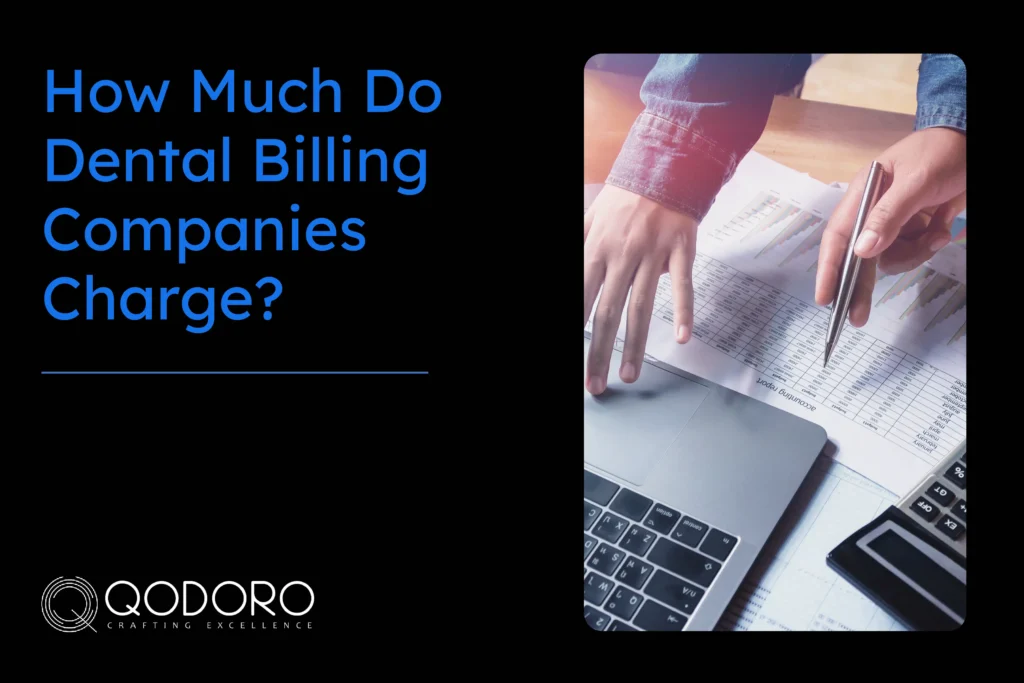
Published on: 02/07/2025

SHARE
Managing a dental practice involves more than patient care; it also means staying on top of billing, insurance claims, and accounts receivable. For many clinics, outsourcing this task to a professional billing service is the smartest move. But there’s one question that every dental practice owner wants answered:
How much do dental billing companies charge?
The answer isn’t as straightforward as a fixed price. It depends on several factors, including your practice size, volume of claims, and the type of billing model you choose. In this blog, we’ll break down everything you need to know from the most common dental billing models to cost influences and how to choose the right pricing plan for your practice.
If you’re planning to hire a dental billing company, one of the first things you’ll want to know is how much it’s going to cost. In most cases, dental billing companies charge a percentage based on your clinic’s monthly collections. This typically ranges between 5% and 1.8%, depending entirely on your monthly revenue. The more your clinic collects, the lower the percentage you’ll be charged. It’s a volume-driven pricing model that rewards higher-performing practices with lower rates.
It’s also important to note that location doesn’t influence billing costs. Whether your clinic is in a busy urban area or a small town, what truly matters is your monthly collections and patient volume. If you operate multiple locations, each one is assessed and billed separately based on its individual performance.
This model ensures transparency and fairness, allowing clinics of all sizes to pay based on the actual work involved. Ultimately, your billing cost is determined by how much business each location generates making the pricing both scalable and straightforward.
To give you a better idea of how this pricing typically plays out, here’s a simple table that shows estimated costs and what’s usually included at different collection levels:
Clinic Type | Monthly Collections | Estimated Billing Fee | Commonly Included Services |
Small Clinic | Up to $30,000 | $800 – $1,500 | Claims submission, basic follow-up |
Mid-Sized Clinic | $30,001 – $60,000 | $1,500 – $3,500 | Claims submission, AR follow-up, partial denial management |
Large Clinic | $60,001 and above | $3,500+ | Full claims support, AR, patient billing, reporting, appeals |
These are approximate figures and can vary based on your billing partner and the exact services you choose. But this breakdown should give you a strong starting point to understand where your clinic might fit and what value you can expect at different levels of support.
The pricing also depends on the type of service arrangement your clinic needs. If you’re outsourcing the entire billing cycle, the cost will generally fall under the standard percentage-based model. However, if you only require stand-alone services such as claim submissions or insurance verifications you may opt for transactional billing. This model is popular among small or single-location clinics, where charges are applied per task (like per claim or verification). It offers flexibility and affordability for clinics with lower volumes. And contrary to common belief, there is no added cost to integrate with your clinic’s software when working with most dental billing companies.
To know the exact cost, it’s best to talk to a few companies and ask for a quote. Make sure you understand what is included in the price. Some companies may look cheaper at first but charge extra for certain tasks. It’s always a good idea to compare not just the price, but also the value you’re getting. Picking the right billing company can save you time, reduce stress, and help your clinic get paid faster.
Dental billing companies usually offer different pricing models to suit varying needs. Choosing the right one can impact not just your expenses but also how efficiently your billing is handled. Dental billing prices vary depending on which model you choose, so it’s important to pick one that aligns with your clinic’s operations.
Here are five popular types of billing models used in the dental industry :
This is the most widely used model in the industry. Dental billing companies charge a percentage of your monthly collections, typically ranging from 5% to 1.8%. The larger your revenue, the lower the percentage you’ll be charged. It’s a scalable and performance-aligned model that ensures the billing company only earns more when your collections increase.
In this model, you pay a fixed monthly amount for access to a dedicated virtual assistant. This remote team member becomes an extension of your staff and handles billing tasks based on your specific needs. It’s ideal for smaller clinics that want part-time help, usually for around 80 hours a month. This setup provides consistent support Monday through Friday, four hours a day, without the cost of hiring a full-time employee.
This model is based on volume, where billing companies charge you per transaction like per claim submission or insurance verification. It’s flexible and widely used by smaller or single-location practices that don’t want to outsource the entire billing cycle. It gives clinics control over their billing budget by only paying for what they use.
The hourly model is not commonly used unless you’re seeking consulting services or need temporary assistance with specific tasks like accounts receivable follow-ups or credentialing. In such cases, rates usually range from $13 to $17 per hour, with a minimum commitment of around 80 hours per month. Rates vary depending on the company, but this model is ideal for short-term needs or expert support in targeted areas.
A mix of percentage and flat fee. For instance, a dental billing company may charge a lower flat rate plus a small percentage of collections above a certain threshold.
Let’s look at the main things that affect how much you’ll pay for dental billing services. These can change depending on your clinic’s needs and setup.
The size of your clinic measured by the number of treating providers (dentists) and locations directly impacts your billing cost. Larger clinics naturally generate more claims, which require additional time and resources to process. This typically results in higher billing fees. On the other hand, smaller practices with one or two providers tend to have fewer claims, resulting in lower billing costs. Since many billing companies follow a volume-based pricing model, high-performing clinics may benefit from lower percentage rates.
The amount you’ll pay also depends on the level of support your clinic needs. Full-service billing includes everything from claim submissions to denial management, AR tracking, and patient billing. Clinics that only need help with specific tasks like claim submissions or insurance verifications can opt for transactional billing, where charges are applied per task. This flexibility helps smaller or single-location clinics manage their billing efficiently without paying for services they don’t need.
Most modern dental billing companies integrate directly with your practice management software at no extra cost. This seamless connection improves accuracy and speeds up processing times. The type of integration and support model you choose such as having a dedicated virtual assistant or using a shared team can also influence your overall cost. Dedicated resources often come with a flat monthly fee, while ad-hoc support is typically priced per task or per hour.
Before selecting a pricing model, it’s important to understand what services dental billing companies actually provide. Most full-service providers offer much more than just claim submissions; they play an important role in improving your revenue cycle and reducing administrative burden.
Dental billing companies manage the entire insurance claims process. They ensure claims are submitted quickly and accurately, which speeds up reimbursements and reduces the chance of errors that lead to denials. If a claim is delayed or rejected, they handle the follow-ups and appeals, working directly with the insurance provider to resolve issues and resubmit claims.
They also take charge of denials and accounts receivable (AR) management. This means tracking every unpaid insurance or patient balance, identifying the cause of non-payment, and taking timely steps to recover the amount. Having a team consistently monitor AR ensures that no revenue gets lost in the system.
Patient billing is another key area. Billing teams generate patient statements, address billing questions, and guide patients through payment processes. This not only improves collections but also enhances the patient experience by offering clarity and support.
Additionally, dental billing companies provide detailed reporting and financial insights. These reports typically include collections performance, outstanding balances, and denial trends. Regular updates help clinics track financial health, identify improvement areas, and make more informed business decisions.
These services when bundled together offer a complete solution to streamline revenue operations, reduce internal workload, and ensure that your practice gets paid faster and more consistently.
Outsourcing dental billing isn’t just helpful, it’s a smart move for most dental clinics.
It takes a big task off your team’s plate, so they can focus more on patient care instead of paperwork. Billing companies are experts at handling claims, following up on payments, managing denials, and making sure you get paid on time.
This means fewer mistakes, faster payments, and better cash flow.
It’s also flexible. Whether you’re a small clinic that needs a few services or a large one looking for full support, there’s a billing model that fits. And most of the time, it’s more affordable than hiring a full-time in-house team.
In short, outsourcing saves time, reduces stress, and helps your clinic grow. That’s why more and more dental practices are choosing it because it works.
Outsourcing dental billing or any tasks will never cost more than in-house. You can save at least 40 to 60% on the cost, and time which makes the business more profitable.
Yes, you can. Most dental billing companies let you choose what you need. You can go for full support or just pick a few things like claim submission or patient billing.
Look for a company that is clear about its pricing and services. Make sure they have experience in dental billing and good reviews. It’s also helpful to ask for a short trial or demo before you decide.
Not at all. Good billing companies work closely with you and provide regular updates, reports, and full transparency. You stay in control while they handle the heavy lifting.
Not at all. Good billing companies work closely with you and provide regular updates, reports, and full transparency. You stay in control while they handle the heavy lifting.

